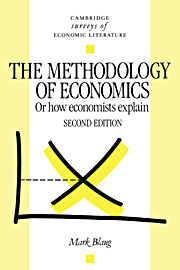Book contents
- Frontmatter
- Contents
- Preface
- Preface to first edition
- Part I What you always wanted to know about the philosophy of science but were afraid to ask
- Part II The history of economic methodology
- Part III A methodological appraisal of the neoclassical research program
- Part IV What have we now learned about economics?
- 16 Conclusions
- Glossary
- Suggestions for further reading
- Bibliography
- Name index
- Subject index
16 - Conclusions
Published online by Cambridge University Press: 10 December 2009
- Frontmatter
- Contents
- Preface
- Preface to first edition
- Part I What you always wanted to know about the philosophy of science but were afraid to ask
- Part II The history of economic methodology
- Part III A methodological appraisal of the neoclassical research program
- Part IV What have we now learned about economics?
- 16 Conclusions
- Glossary
- Suggestions for further reading
- Bibliography
- Name index
- Subject index
Summary
The crisis of modern economics
The 1960s was a decade in which the public esteem of economics and the professional euphoria of economists rose to an all-time pitch. The 1970s, on the other hand, have been full of talk of “crisis,” “revolution,” and “counterrevolution,” amounting at times to a veritable orgy of self-criticism on the part of some of the leading spokesmen of the economics profession. According to Wassily Leontief (1971, p. 3), “Continued preoccupation with imaginary, hypothetic, rather than with observable reality has gradually led to a distortion of the informal valuation scale used in our academic community to assess and to rank the scientific performance of its members. Empirical analysis, according to this scale, gets a lower rating than formal mathematical reasoning.” Furthermore, he charged, economists care too little about the quality of the data with which they work and he blamed this attitude on the baleful influence of the methodology of instrumentalism or as-if theorizing (p. 5). Henry Phelps Brown (1972, p. 3), however, went much further: what is basically wrong with modern economics, he argued, is that its assumptions about human behavior are totally arbitrary, being literally “plucked from the air,” and he blamed this habit of building make-believe worlds on the failure to train economists in the study of history. David Worswick (1972, p. 78) voiced similar sentiments, adding that “there now exist whole branches of abstract economic theory which have no links with concrete facts and are almost indistinguishable from pure mathematics.”
- Type
- Chapter
- Information
- The Methodology of EconomicsOr, How Economists Explain, pp. 237 - 248Publisher: Cambridge University PressPrint publication year: 1992



